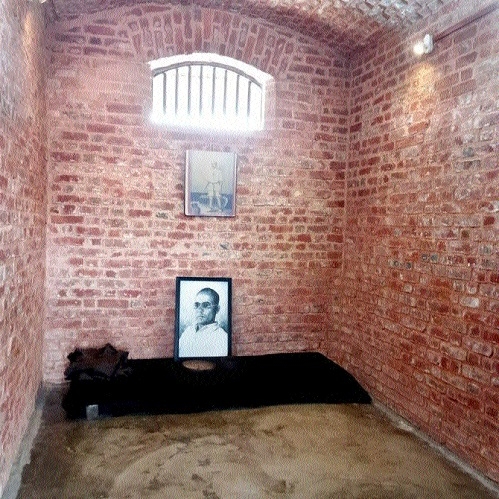Of the immortal soul
15 Aug 2023 09:12:10

Swatantryaveer Vinayak Damodar Savarkar’s cell in the Andaman prison.
By Vijay Phanshikar :
“Anaadi mee anant mee,
avadhya mee bhalaa
(No beginning or end do I have, I the immortal)
Maaril ripu jagati
asaa kavan janmala!”
(Yet to be born is the enemy that can kill me)
- Opening lines of a Marathi poem by
Swatantryaveer
Vinayak Damodar Savarkar
THESE immortal lines form an integral part of the Indian literature that depicts the epic struggle for Independence. This poem -- Anaadi mee anant mee .. has inspired generations of people who consider Swatantryaveer Vinayak Damodar Savarkar their icon.
The spiritual message of this poem is unmistakable. It communicates the core principle of Indian philosophy of
immortality of soul -- the Atman. Both the stanzas of the epic poem take the reader to the ancient belief of Aham Brahmasmi -- I am the Brahman! I am the immortal. For, I have no beginning and no end. I am the eternal being.
This poem has a very special importance in the patriotic thought-process of India. When Swatantryaveer Savarkar was languishing in the Andaman prison, going through rigorous punishment day in and day out, day after day, week after week, month after month, year after year, his body started wilting, pushing him to the brink of death. All the time, he fought hard to keep himself awake, let alone alive. Yet, there was no respite from the rigours and
cruelty and isolation. Every moment appeared to bring him closer to dying. Swatantryaveer Savarkar was sure, he would perish any moment, falling dead -- having been killed by the merciless jailors in what could be called an official homicide.
And then came a moment -- divine in every sense. There, lying on the stone floor of his prison cell in the Cellular Jail in the Andaman isles, the young Savarkar suddenly realised that he was immortal and nothing could kill him -- Amrutasya Putrah (Child of the Immortal)! In that spiritual flash of self-realisation, all the sanskaar of his lifetime, all the ancient wisdom that often marked the great and ageless Indian discourse came up from the
deepest depth of his mind. The young barrister who was jailed by the alien British rulers for his masterminding of
revolutionary activities suddenly felt that nothing -- no enemy, no weapon -- could kill him:
avadhya mee bhalaa !
May anything happen, may there be much more hardship, may there be more misery ... come what may, I will endure all this. For, I am the child of the Immortal -- Amrutasya Putrah!
Didn’t Lord Krishna tell Arjuna in the epic advice of Geeta, Savarkar must have exclaimed to himself:
Hato vaa prapyasi swargam, jitva vaa bhokshase mahim/ (Perish if you do in the battle, you would attain Heaven, live if you do through the battle, you would rule the earth)
Tasmaduttishtha Kaunteya uddhay krutanischaya//
(So Kaunteya -- son of Kunti -- rise and resolve to fight) ...!
That was the moment when the spirit triumphed over the body. That was the moment that would some day in the future win for Savarkar the iconic epithet Mrityunjay - the one who conquers death!
Later, may be years later, Savarkar penned the iconic poem that has become an integral part of the Indian
consciousness of freedom:
Anaadi mee anant mee, avadhya mee bhalaa ....!